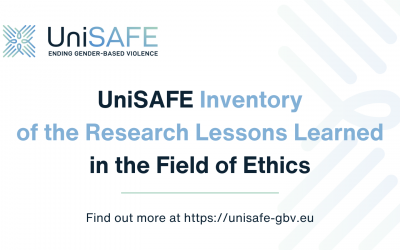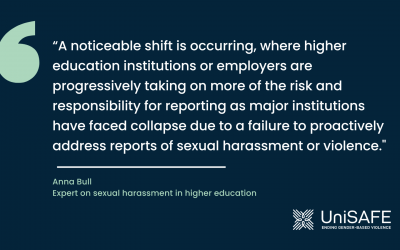Gathering data on experiences of gender-based violence is a sensitive issue. UniSAFE takes all necessary measures to protect the privacy of survey participants and the confidentiality of the collected data. Claudia Schredl, scientific associate at GESIS Leibniz Institute for the Social Sciences and UniSAFE partner, elaborates on what happens to the data collected in the UniSAFE survey.
Will the survey be anonymous?
Participation in the UniSAFE online survey is anonymous. Participants do not need to register or identify themselves to take part. The survey is accessible via a static, non-personalized link.
Participating institutions will not share any individual contact details, such as email addresses, with the UniSAFE survey team.
How do you guarantee the anonymisation of data?
UniSAFE will provide participating institutions with an anonymised data set, containing only the data collected at their institution. As a further protection of participants’ anonymity, this data will only be shared after ensuring that the information collected cannot be used to re-identify individual participants, including through contextual re-identification.
As an example, if cross-checking information such as age and job title would make it possible to identify individual participants, UniSAFE will either delete such information or make it less specific (e.g., the exact age of respondents will be grouped into age brackets) before making it available.
Within the framework of the UniSAFE project, the data will not be analysed at university level or country level. We will analyse the data across all 49 institutions by category, for example, by target groups (students, staff members, international mobile researchers) or academic fields.
Will participating universities be able to see answers?
Participating institutions will be only provided with an anonymised data set of their institution, shared after checking for potential re-identification risks. UniSAFE acknowledges the personal and sensitive character of this research and takes all necessary measures to protect the privacy of the survey participants and confidentiality of the collected data.
UniSAFE provides each institution with their own data on the prevalence of gender-based violence, its determinants, and consequences. Supplemented with tools and recommendations developed by the project at a later stage, the provided institutional data will support the participating institutions in tackling gender-based violence. This also means that the more staff and students participate in the UniSAFE survey, the more reliable and meaningful the survey results become for each institution.
What happens to the data at the end of the survey?
The aim of the survey is to produce better knowledge on gender-based violence in universities and research organisations, and to translate this knowledge into operational tools for higher education, research organisations and policymakers. Research findings will be disseminated, through meetings, workshops, conference presentations, scientific and media publications as well as the project’s webpage.
UniSAFE complies with the GDPR to ensure data security. At the end of the project, the data from all research performing organisations will be made available for secondary research in accordance with the European Union’s Open Access policy. For this purpose, the data will be processed in the same way as the data shared with participating institutions. Any data potentially usable for re-identification will be either diluted or removed from the data set. The remaining data will then be permanently and securely stored at an open access data repository within the EU, where it will be available for legitimate scientific purposes on request.
The last page of the survey includes an invitation to participate in an individual interview. Will the data be related?
On the last page of the UniSAFE survey, respondents can also register their email address via an external link if they would like to voluntarily share their experiences with gender-based violence in an interview as well. The data collection process of the survey is complete at this point and the last page is not included in the survey.
The external link leads the volunteers directly to the official UniSAFE website where further information is provided. There is no possibility to relate the collected survey data with the shared email address.



